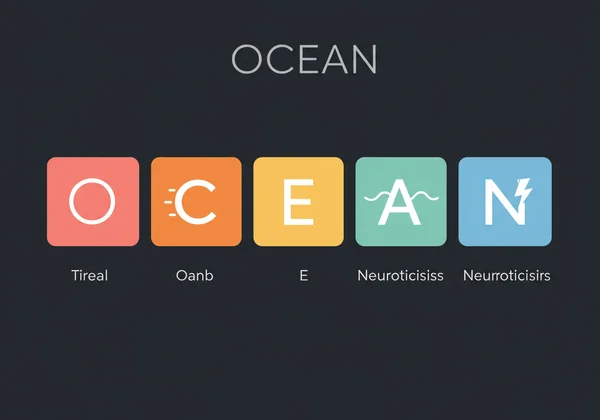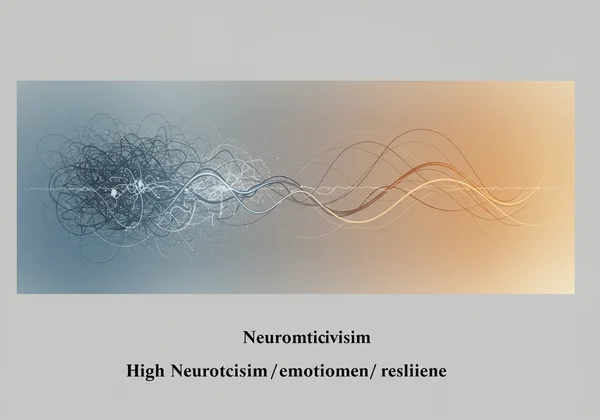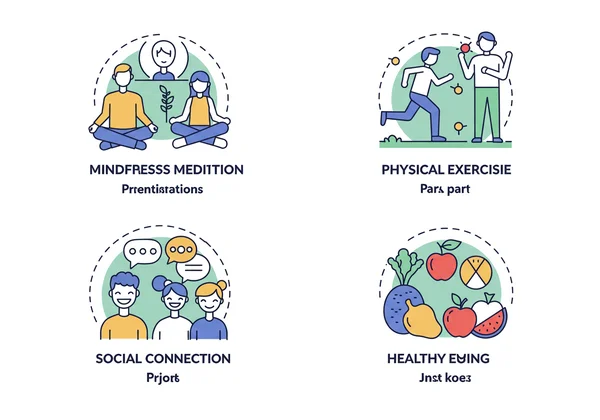Big 5 Neuroticism: Understanding Emotions & Building Resilience
Introduction: Uncover Your Emotional Landscape: What is Big 5 Neuroticism?
Do you ever feel like you're riding an emotional rollercoaster, where small bumps in the road feel like mountains? Or perhaps you're known for your steady calm, even when chaos erupts around you. These tendencies are not random; they are deeply connected to a core part of your personality. Many of us are fascinated by what makes us tick, especially when it comes to our emotions. Among the most respected tools in psychology for understanding personality, the Big 5 model stands out. Today, let's explore one of its most intriguing—and often misunderstood—traits: Neuroticism.
Understanding this trait is the first step toward mastering your emotional world, improving your relationships, and unlocking personal growth. So, what is Big 5 Neuroticism? It's a fundamental dimension of personality that describes an individual's tendency to experience negative emotions like anxiety, worry, fear, and sadness. By exploring where you fall on this spectrum, you can gain powerful insights into your inner workings. Curious to begin your journey of self-discovery? Our free test is a great place to start, offering a baseline understanding of your unique personality profile.

What is Neuroticism in the Big 5 Personality Model?
The Big 5, or Five-Factor Model, is the leading scientific model of personality, trusted by psychologists and researchers worldwide. Its scientific validation has been established across decades of research and it maps personality across five broad dimensions: Openness, Conscientiousness, Extraversion, Agreeableness, and Neuroticism (often remembered by the acronym OCEAN). Neuroticism is the dimension that captures our emotional stability and resilience.

It's important to remember that Neuroticism isn't a fixed state, but rather a spectrum. It's not a diagnosis or a negative label. Instead, it ranges from high sensitivity to emotional stimuli on one end, to remarkable emotional stability on the other. Your score simply indicates your natural predisposition for reacting to life's stressors. Learning your score through a reliable [personality assessment tool] can provide a clear, objective starting point for self-improvement.
Defining the Emotional Stability Dimension (OCEAN)
In the OCEAN model, Neuroticism is often discussed in terms of its opposite pole: emotional stability. If you score low in Neuroticism, you are considered high in emotional stability. This dimension is a powerful predictor of how we perceive the world—whether we are more likely to see it as threatening and difficult, or as safe and manageable.
Individuals with high Neuroticism are more reactive to stress. They are more likely to interpret ordinary situations as threatening and minor frustrations as hopelessly difficult. Their negative emotional reactions tend to persist for unusually long periods, meaning they are often in a bad mood. These challenges with emotional regulation can diminish their ability to think clearly, make decisions, and cope effectively with stress.
How Neuroticism Differs from Other Big 5 Traits
To truly grasp Neuroticism, it helps to see how it stands apart from the other big 5 traits. While Extraversion governs our social energy and need for external stimulation, Neuroticism relates to our internal emotional climate. A person can be a highly social extravert but also high in Neuroticism, constantly worrying about social acceptance.
Similarly, Conscientiousness involves our level of organization and discipline. Someone high in Conscientiousness might create detailed plans, but if they are also high in Neuroticism, they may experience intense anxiety about those plans failing. Each of the five traits is an independent piece of the puzzle that makes you who you are. A comprehensive [scientific personality test] helps you see how these traits interact to shape your unique identity.
High vs. Low Neuroticism: Traits & Behaviors
Understanding the specific behaviors associated with high and low levels of Neuroticism can bring this abstract concept to life. Do you see yourself or others in these descriptions? Remember, most people fall somewhere in the middle, but recognizing these tendencies is key to personal insight.
Characteristics of High Neuroticism (Emotional Sensitivity)
People who score high in Neuroticism are often described as having high emotional sensitivity. This isn't inherently bad; it means they are finely tuned to their emotional environment. However, it often manifests in ways that can be challenging.
Common characteristics include:
- Frequent Worrying: A tendency to ruminate on things that might go wrong.
- Anxiety and Tension: Often feeling tense, jittery, or on edge.
- Mood Swings: Experiencing frequent and intense shifts in mood.
- Self-Doubt: A persistent inner critic that questions their abilities and decisions.
- Vulnerability to Stress: Feeling easily overwhelmed by daily stressors and challenges.
Understanding Low Neuroticism (Emotional Resilience)
On the other end of the spectrum are those with low Neuroticism, who exhibit strong emotional resilience. They are less emotionally reactive and tend to be calm, even-tempered, and secure. They can face setbacks and stressful situations without becoming upset or rattled.
Common characteristics include:
-
Calm Demeanor: Rarely feeling sad or depressed.
-
Even-Tempered: Not easily angered and maintaining emotional control.
-
Stress-Resistant: Effectively coping with stress and pressure.
-
Confident: Feeling secure and satisfied with themselves.
-
Optimistic Outlook: Generally maintaining a positive and relaxed attitude.

The Impact of Neuroticism on Your Life & Relationships
Your level of Neuroticism doesn't just stay inside your head; it profoundly influences your career, your health, and your relationships. Recognizing its impact is the first step toward harnessing your traits for a more fulfilling life. The insights from a [free big 5 personality test] can illuminate these connections in a deeply personal way.
Neuroticism and Mental Well-being: Stress, Anxiety, & Mood
There is a strong, well-documented link between high Neuroticism and challenges with mental well-being. Because this trait amplifies negative emotions, individuals who score high are more susceptible to developing anxiety disorders, depression, and other mood-related issues. They live in a state of heightened alert, which can be mentally and physically exhausting.
However, awareness is power. By understanding this predisposition, you can proactively focus on managing anxiety and building coping mechanisms. It’s not about eliminating the trait, but about learning to navigate it effectively.
Navigating Relationships with Varying Neuroticism Levels
Neuroticism plays a huge role in our interpersonal relationships. A person high in Neuroticism might require more frequent reassurance and validation from a partner, which can be draining for someone with very low Neuroticism who doesn't naturally provide it. Conversely, a low-Neuroticism individual might seem aloof or uncaring to their more sensitive partner.
Understanding these differences can foster empathy and better communication. When you know your partner’s (or friend's, or colleague's) personality profile, you can adapt your approach and prevent misunderstandings. Discovering your own profile is the best place to start. Why not [discover your results] today?
Actionable Strategies for Managing Neuroticism & Building Resilience
Gaining insight from your Big 5 profile is powerful, but applying that knowledge is where true personal growth happens. The true value of understanding your Big 5 profile comes from using that insight to make positive changes. Whether you score high, low, or in the middle for Neuroticism, there are always ways to build greater emotional resilience.
Techniques for Enhancing Emotional Stability
If you recognize high-Neuroticism tendencies in yourself, don't despair. You can actively work on enhancing emotional stability with proven techniques.
-
Mindfulness and Meditation: These practices train your brain to observe thoughts and feelings without getting carried away by them.
-
Cognitive Behavioral Therapy (CBT) Principles: Learn to identify, challenge, and reframe negative thought patterns that fuel anxiety and worry.
-
Regular Physical Activity: Exercise is a powerful, natural antidepressant and anti-anxiety remedy.
-
Journaling: Writing down your worries can externalize them, making them feel more manageable and providing clarity.

- Mindfulness/Meditation: A silhouette of a person in a calm meditative pose, perhaps with a subtle lotus flower or radiating calm lines.
- CBT: Two interconnected thought bubbles, one with a negative symbol transforming into a positive one.
- Physical Activity: A simplified icon of a person running or doing a yoga pose.
- Journaling: An open notebook with a pen, perhaps with abstract squiggles representing thoughts. The overall style should be minimalist, modern, and soothing, using a harmonious color palette.
Leveraging Your Traits for Personal Growth
Neuroticism is not a weakness. In fact, its associated sensitivity can be a superpower when channeled correctly. High emotional sensitivity can translate into greater empathy, deeper creativity, and a strong drive for self-improvement. Your tendency to anticipate problems can make you an excellent planner and risk manager.
The key is to use self-awareness as a tool for personal growth. By understanding your emotional landscape, you can learn to ride the waves instead of being pulled under by them. A detailed report, like the AI-powered analysis offered after our test, can provide personalized strategies to turn your challenges into strengths.
Your Emotional Journey: Leveraging Big 5 Insights
Neuroticism is a fundamental and influential part of your personality. It shapes how you experience the world, react to stress, and connect with others. By moving beyond simple labels and embracing the scientific insight of the Big 5 model, you can transform self-doubt into self-awareness and anxiety into action.
Ultimately, your emotional journey is uniquely yours. Understanding your Big 5 traits can feel like being handed a personalized map – it won't erase the challenges, but it will certainly illuminate the best paths to navigate them. Why not take that first step today?
[Start your free Big 5 Personality Test] now to receive your core scores and unlock a deeper understanding of what makes you, you. Share your thoughts or questions in the comments below!
Frequently Asked Questions About Big 5 Neuroticism
What are the core components of high Neuroticism?
High Neuroticism is primarily characterized by a tendency towards negative emotional states. Psychologists break it down into facets like anxiety, angry hostility, depression, self-consciousness, impulsiveness (in the sense of being unable to resist urges or cravings), and vulnerability to stress.
Can your Neuroticism score change over time?
Yes, personality traits are stable but not set in stone. While there's a genetic component, your Neuroticism score can decrease over time with age, life experiences, and conscious effort. Engaging in practices like therapy, mindfulness, and building self-awareness can lead to significant improvements in emotional stability. Our AI-enhanced report offers actionable tips for this kind of personal growth.
Is Neuroticism always a negative trait?
Absolutely not. While it's linked to challenging emotions, the heightened sensitivity of high Neuroticism can also foster empathy, creativity, and a realistic awareness of threats and risks. This can make individuals excellent planners and compassionate friends. The goal is not to eliminate it but to balance it.
How does the Big 5 test help understand my Neuroticism?
A scientifically validated big 5 personality test provides an objective, nuanced score rather than just a vague feeling. It shows you where you stand relative to the general population and provides a framework for understanding how this trait impacts your behavior. It moves you from "I think I worry a lot" to "I score in the 85th percentile for Neuroticism, which explains my reaction to stress."
What personality test is used by psychologists to assess Neuroticism?
Psychologists overwhelmingly use assessments based on the Five-Factor Model (the Big 5) because of its extensive scientific validation and reliability over decades of research. Our test is built on this very model, ensuring you get insights that are both meaningful and trustworthy. You can [try our free tool today] to experience the gold standard in personality assessment.